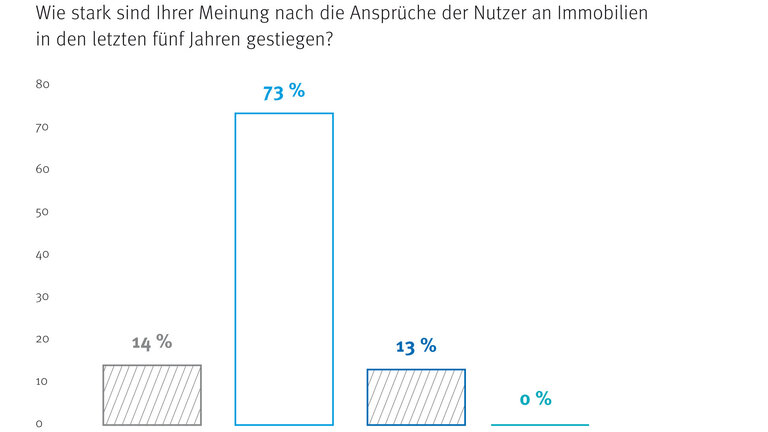Expo Vision was held at nine German locations this year, including Stuttgart, Munich, Hamburg and Cologne. The participants included top players from each region: investors, advisors, politicians, project developers, lawyers and real estate experts as well as representatives from various sectors. The attendees in every city agreed on one point: the working environment in particular has changed fundamentally. "This is a trend that is dictating the overall real estate sector more and more. It requires a change of perspective: in future, users will no longer look for buildings that are suitable for them, but instead the buildings will adapt to their users – the results of the Expo Vision flash survey also confirm this", said Peter Tzeschlock, CEO of Drees & Sommer SE.
Connectivity must meet high standards
For more than 70 percent of the Expo Vision respondents, there are primarily two major aspects of real estate in which user demands have changed most markedly: firstly, requirements relating to mobility and connectivity; secondly, digitalization plays an increasingly important role in buildings. More than half of those surveyed also report high user requirements in relation to health and well-being.
Still a lot to do in office real estate
By far the greatest need for action with regard to user requirements is in office real estate, according to almost 90 percent of Expo Vision experts. For around 30 percent, there are still deficiencies in connection with commercial and health-related real estate. Micro-apartments and student accommodation are already very well adapted to the target group, in the participants' opinion. Only 14 percent report that there is still room for improvement in this respect.
Users satisfied – return goes up
Two thirds of respondents consider that project developers in particular are far ahead when it comes to meeting user requirements. Private builder-owners are assessed as very user-oriented by 43 percent. Only 14 percent of investors such as investment funds or pension funds come into this category, according to the respondents. Public developers do particularly badly in this regard: only 9 percent of participants in the survey find that the public sector adapts its buildings well to user requirements.
Around 89 percent of respondents hold the view that meeting user demands is highly or very highly important for the ability of real estate to generate returns. Only 9 percent see a low correlation in this respect.
The digital transformation and the accompanying complete change in user requirements nevertheless occupied everyone's attention as a totally location-independent phenomenon in the regional rounds of discussion.
